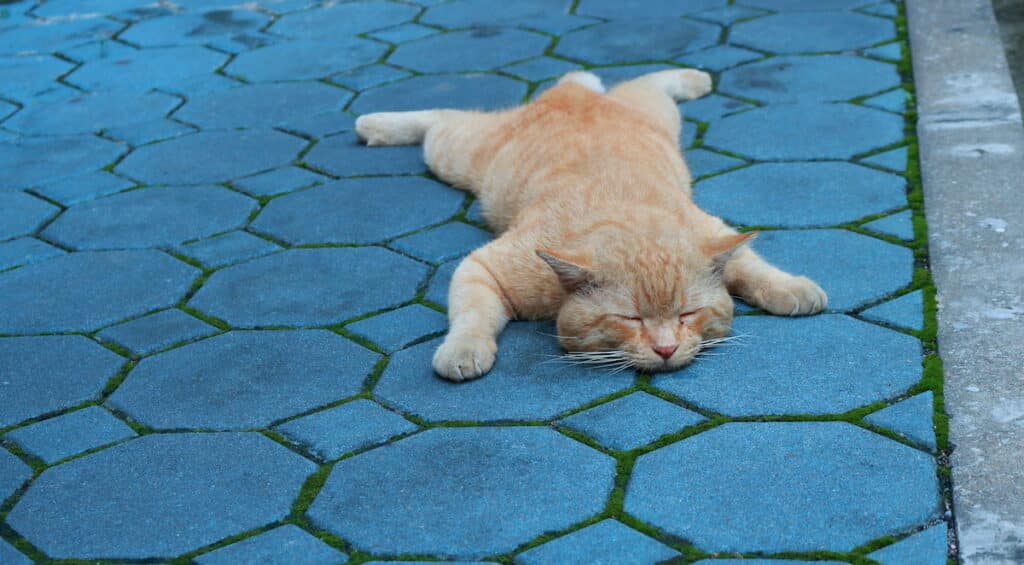Is acting weird? When they’re ill, cats are very good at keeping secrets. It’s perfectly normal for you to not see them for several hours during the day. However, it’s possible that they’re attempting to manage their pain and discomfort if they begin to hide in quiet, dark places. In the wild, this instinct would protect them from predators. Is your cat behaving oddly? Here’s how to interpret the cautionary signs:
Signs of a Sick Cat
Your first thought was probably, “My cat is acting strangely,” so you need to figure out why. Watch out for:
Increased drinking and eating
This might be a precursor to diabetes. and hyperthyroidism when it is accompanied by a rise in appetite. Another common cause of your cat eating a lot more is inflammatory bowel disease, which may also be to blame for this.
Reduced eating
Alarm bells should go off if your appetite suddenly disappears. This could be a reaction to recent vaccinations for cat flu and leukemia, or it could be a result of environmental changes. This can be a serious condition that requires immediate attention from your veterinarian because when fat is consumed from the body, the liver will start to shut down quickly.
Changes in the litter tray
If your cat has issues with painful hips and knees, their litter box habits may change. Diabetes may be indicated by increased urination, and a urinary tract condition may be the cause of pain when urinating. Blood in the urine may be a sign of cancer or genetic problems. The inability to urinate due to a change in diet or a blockage may be caused by constipation. Diarrhea suggests an underlying illness or an allergic reaction. See your vet right away because these problems can quickly become life-threatening.
Excessive fur shedding
If your cat loses fur frequently, it may be a sign of allergies or hypothyroidism, a condition affecting the thyroid gland. Changes in diet and flea treatment may be necessary for these, which could be caused by food or fleas. Worms, ulcers, or infections can also be causes of coat changes.
Behavioural differences
A change in behavior suggests that something is off. Antisocial behavior can be sparked by the stress of moving homes, a new baby, or being left alone for extended periods of time. In particular, if your cat is growling or biting when touched, you may need to schedule a visit to the vet if those possibilities have been ruled out.
Lethargy
Anaemia, an injury, or another system disorder may be present if your cat is overly sleepy and drowsy. Additionally, cancer is a possibility. Older cats will require more sleep, but strange sleeping patterns should be looked into.
Vomiting
It’s likely that your cat’s illness is more serious than just hairballs if it occurs frequently. Foreign objects that become lodged in the throat can obstruct the oesophagus and seriously obstruct the intestines. A trip to the veterinarian is necessary because kidney disease is another condition that can cause excessive vomiting in animals.
Weight loss or gain
In addition to stress, many other health conditions will result in weight gain. Your veterinarian needs to rule out conditions like an overactive thyroid, cancer, diabetes, viruses, and digestive issues.
Swollen gums
Swollen and red gums are signs of gum disease. You’ll notice any change if you regularly brush your cats’ teeth. Dental disease is a sign of bad breath, and diabetes may be indicated by sweet-smelling breath. Obtain guidance on the best course of action.
Discharge and breathing issues
Shortness of breath, a symptom of a respiratory condition, can accompany eye and nose discharge. Coughing and altered breathing patterns can indicate dehydration, tumors, or even asthma.
Body growths
Infections, tumors, and cancer are a few possible causes of external lumps. You should get in touch with your vet right away if you notice any strange growths.
No grooming or washing
Older cats typically require more assistance with grooming because conditions like arthritis make it challenging to reach certain areas. However, it’s not typical for your cat to appear untidy and dirty. You should visit your veterinarian if your cat is not washing itself properly.
Disorientation
An elderly cat will typically exhibit this strange behavior. When coupled with other neurological symptoms like howling, not use in the litter box, and bumping into things, it’s frequently the first indication of a neurological disorder.
Unusual body positions
Your cat will adopt an unusual sitting position when it is in severe pain, tucking its feet under and keeping its nose to the ground. Another telltale sign of pain is a hunched back and very short walking strides.
Cat Euthanasia at Home
Consider a gentle end-of-life option if there is no medical intervention that will help. When you seek assistance from your neighborhood home visit veterinarians, the process of euthanizing a cat will be done with respect and dignity.














